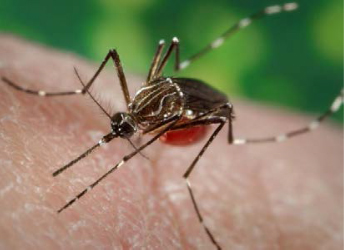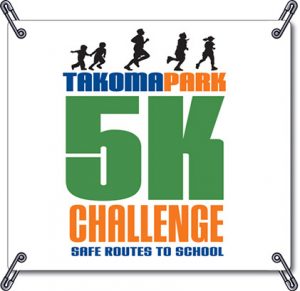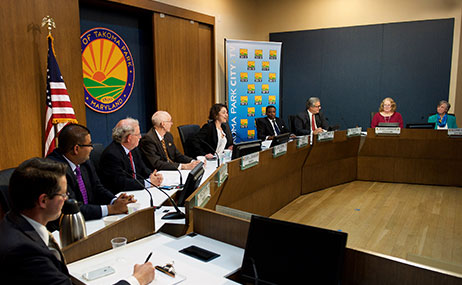Takoma Park is working with Montgomery County and the State of Maryland to combat the spread of Zika and monitor areas where the Aedes aegypti and Aedes albopictus mosquitoes are found.

From Ron Hardy, the City of Takoma Park’s Emergency Preparedness Manager:
Dear Takoma Park Residents,
Mosquito season is upon us. The Zika virus is a major concern of many who travel to current areas where the Zika virus can be found and to areas of the United States where the mosquito breeds that could potentially spread the Zika virus. Montgomery County has a website with additional information and direction on the Zika virus and mosquito control at www.montgomerycountymd.gov/mosquito.
How can the Zika virus be spread?
There are several ways the Zika can be spread.
- Most common is being bitten by an infected mosquito
- A mosquito biting an infected person and carrying the virus to another human
- Sex with an infected male partner
- From a pregnant mother to the fetus (will cause development problems in the child).
What is Takoma Park doing to prevent the spread of Zika?
Takoma Park has contacted the MD Department of Agriculture to request that we be added to the larval testing program. We will be making site visits to all public bio-retention areas to ensure they are functioning as designed and not holding water for more than 24 hours. We will identify a contractor able to provide treatment for aquatic mosquito larvae. We will develop a list of known inlets or catch basins that store water and will consider treatment if necessary. We will review the MD Department of Agriculture website and additional information for best practices and treatment options to limit or eradicate mosquitoes that could be harmful to human health.
What can you do to eliminate standing water in and around your home?
Once a week:
- Empty and scrub, turn over, cover, or throw out items that hold water, such as tires, buckets, planters, toys, pools, birdbaths, flowerpots, or trash containers
- Clean rain gutters to allow water to flow freely.
- Store plastic wading pools inside or turn them upside down when not in use.
- Turn over or remove clay pots and plastic containers.
- Dispose of all empty beverage containers, plastic wrappers, discarded toys, etc.
- Check for trapped water in plastic or canvas tarps used to cover boats, pools, etc. Arrange the tarp to drain the water.
- Replace water in bird baths at least twice a week.
- Remove pet food and water dishes that are not being used.
- Containers without lids, use wire mesh with holes smaller than an adult mosquito.
- Tightly cover water storage containers (buckets, cisterns, rain barrels) so that mosquitoes cannot get inside to lay eggs.
- Turn wheelbarrows upside down when stored outside
What can you do to keep mosquitoes out of your home?
- Use screens on windows and doors.
- Repair holes in screens.
- Use air conditioning when available.
Use an Environmental Protection Agency (EPA)-registered insect repellent with one of the following active ingredients: DEET, picaridin, IR3535, OLE, or PMD. All EPA-registered insect repellents are evaluated to make sure they are safe and effective.
The effectiveness of non-EPA registered insect repellents, including some natural repellents, is not known. For more information: www2.epa.gov/insect-repellents
What can parents do to protect their children?
To protect your child from mosquito bites:
- Dress your child in clothing that covers arms and legs.
- Cover crib, stroller, and baby carrier with mosquito netting.
- Do not use insect repellent on babies under 2 months of age.
- Do not use products containing oil of lemon eucalyptus or para-menthane-diol on children younger than 3 years old.
- In children older than 2 months, do not apply insect repellent onto a child’s hands, eyes, mouth, or to irritated or broken skin.
- Never spray insect repellent directly on a child’s face. Instead, spray it on your hands and then apply sparingly, taking care to avoid the eyes and mouth.
If your child has symptoms, take him or her to see a health care provider.
For children with Zika symptoms of fever, rash, joint pain, or red eyes who have traveled to or resided in an affected area, contact your child’s health care provider and describe where you have traveled. Note that fever(≥100.4° F) in a baby less than 2 months old always requires evaluation by a medical professional. If your baby is less than 2 months old and has a fever, call your health care provider or get medical care.
How do I protect myself from mosquito bites?
- Wear insect repellent: Yes! It is safe. When used as directed, insect repellent is the BEST way to protect yourself from mosquito bites—even children and pregnant women should protect themselves. Higher percentages of active ingredient provide longer lasting protection.
- DEET: Products containing DEET include Cutter, OFF!, Skintastic.
- Picaridin (also known as KBR 3023, Bayrepel, and icaridin): Products containing picaridin include Cutter Advanced, Skin So Soft Bug Guard Plus, and Autan outside the United States).
- Oil of lemon eucalyptus (OLE) or PMD: Repel contains OLE.
- IR3535: Products containing IR3535 include Skin So Soft Bug Guard Plus Expedition and SkinSmart.
- Cover up: When weather permits, wear long-sleeved shirts and pants.
- Keep mosquitoes outside: Use air conditioning and make sure that you repair and use window/door screens.
- If you have to work outside: wear long-sleeved shirts and pants and make use of work gloves. Spray exposed areas of your body with insect repellant and spray your clothes with a product that is used for clothing to repel insects.
About Outbreaks Spread by Mosquitoes
- Many areas in the United States have the type of mosquitoes that can become infected with and spread Zika, chikungunya, and dengue viruses.
- Recent outbreaks in the continental United States of chikungunya and dengue, which are spread by the same type of mosquito, have been relatively small and limited to a small area.
- The Center for Disease Control is not able to predict if Zika virus will spread in the continental United States. However, areas with past outbreaks of chikungunya and dengue are considered at higher risk for Zika. These include U.S. territories like Puerto Rico, the U.S. Virgin Islands, and Guam. Local outbreaks have also been reported in parts of Hawaii, Florida, and Texas.
- For Aedes aegypti or Aedes albopictus mosquitoes to cause an outbreak in the continental United States, all of the following must happen:
- People infected with a virus (like Zika, dengue, or chikungunya) must enter the United States.
- An Aedes aegypti or Aedes albopictus mosquito in the United States bites an infected person during the first week of infection when the virus can be found in the person’s blood.
- The infected mosquito lives long enough for the virus to multiply and for the mosquito to bite another person.
- The cycle continues multiple times to start an outbreak.










